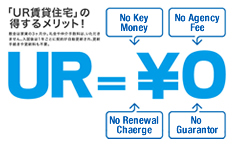
- Deposit 【敷金”ShikiKin” or 保証金”Hoshokin”】
-
A sum of money paid in relation to a rented item to ensure it is returned in good condition.The landlord will take a sum of money from the person(s) renting the item (the tenant). If the item is returned in good condition at the conclusion of the tenancy the owner should return the deposit. If the item is returned with damage beyond normal wear and tear, the cost of repairing that damage may be charged against the deposit, and part (or none) of the deposit will be returned.
- Key Money 【礼金”ReiKin”】
-
A mandatory payment to the landlord that is often the same as one to two months of rent. This money is considered a gift to the landlord and is not returned after the lease is canceled. It is started when a father or a student came to a big city (Tokyo) from a rural city to work or to attend university. They gave money to the landlord to thank him for letting them rent a room. The landlord took the money as a promise to take care of them. It is an old custom, and it is still used today. However, today, there are many rooms which do not have “Reikin”.
- Free rent【フリーレント“Free rent”】
-
The landlord gives a few weeks or months of rent-free period to attract new tenants.
- Guarantor Company【保証会社“Hoshogaisya”】
-
A company that acts as a guarantor on behalf of a tenant. It usually cost 50%~100% of rent and management fee, and the payment is made at the time of signing the lease contract. There are more landlords who prefer a guarantor company than a guarantor. In some cases, the landlord requires a guarantor company in addition to the guarantor.
- Emergency contact 【緊急連絡先”Kinkyurenrakusaki”】
-
Emergency contact is someone who is contacted in case of tenant’s emergency. They do not have any responsibility to pay anything. If the landlord or guarantor company cannot contact with the tenant, the emergency contact will be contacted. To be an emergency contact, it is preferred with co-worker or friends who live in Japan.
- Guarantor【保証人“Hoshonin”】
-
A person who takes all the blame and pays the rent to the landlord when the tenant cannot pay it for some special circumstance. It is usually a direct family member.
- Background check【入居審査“Nyukyoshinsa”】
-
From the information on the application, the owner of the room judges the tenant’s worthiness. The key point of this check is to assure the landlord to receive rent every month, there is a chance that they turn down the application. If you are using a guarantor company, their check also takes place at the same time. AghartA Inc always check with the owner if they would
accept the customer we have before showing the room, and thus reduce the chance to be declined the application.
- Maintenance fee 【管理費“Kanarihi” 共益費“Kyoekihi”】
-
The fee used for maintaining the cleanliness of the public area of the building, such as hallway, stairs, elevators, and garbage station. It also pays for light bulbs and other things to keep the place attractive. Maintenance fee differs from building to building. Usually, buildings with janitor or auto lock entrance have higher maintenance fee.
- Renewal fee 【更新料”Koshinryo”】
-
When the contract period is ended, and you would like to renew the contract, renewal fee needs to be paid. Usual contract period is two years and renewal fee is about a month to a month and half of the rent. You can leave the place before the term ended, but if you’d like to stay there longer than the term period, you need to pay this fee. Before you sign the contract, you may want to check it.
- First month rent【前家賃“Maeyachin”】
-
The first month rent you pay at the contract signing (This is always included in the initial payment). If you are moving in in the middle of the month, the total of the partial month payment and the next month full payment is the first month payment. Be aware that it may go over the monthly payment if you move in in the middle of the month.
- No return money【償却“Shokyaku”】
-
The part of deposit that doesn’t return to the tenant regardless of the maintenance the tenant performed. It should be stated on the contract.
- Tenant responsibility【原状回復義務“Genjokaifukugimu”】
-
The tenant is responsible for keeping the place the way it was rent. When the place is damaged and require some kind of repair, it is the tenant’s responsibility to fix it. Most likely the landlord charges for the fee to fix and subtract it from the security deposit. Normal wear and tear is excluded.
- Agency fee 【仲介手数料”Chukaitesuryo”】
-
The money that paid to the real estate agent who find a room for you. It is equal to a month of rent + tax (5%). We also show the customer properties with campaign of 50% discount on agency fee and no agency fee. Please ask us about the detail.













